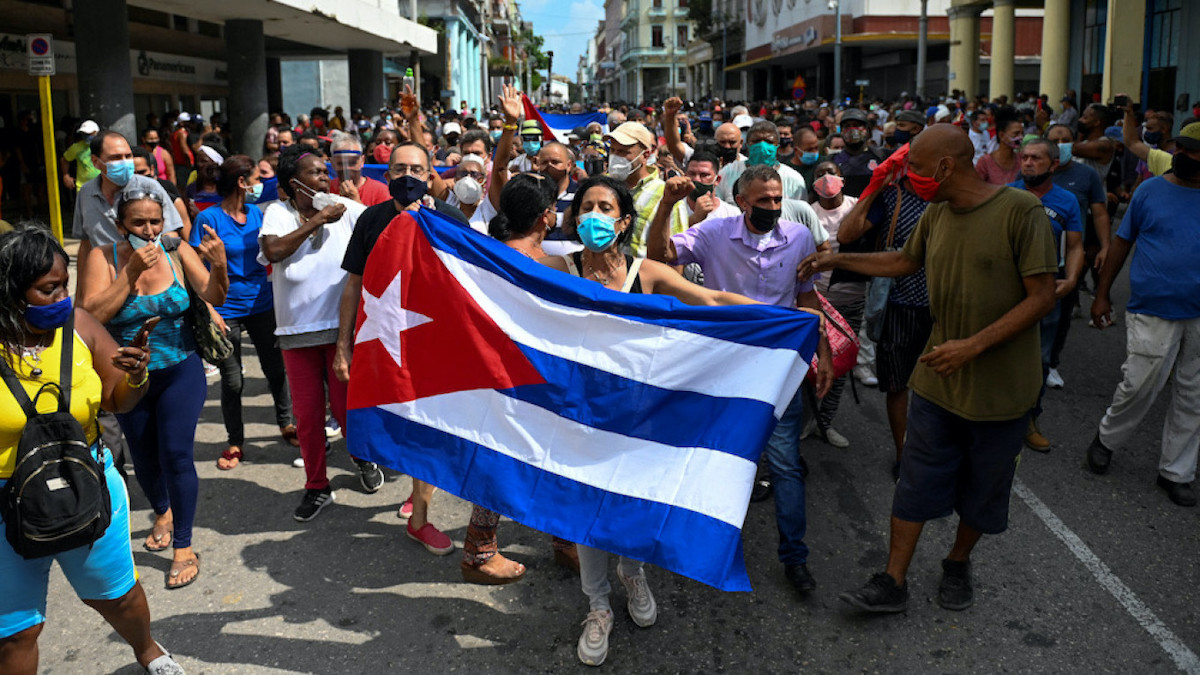Sunday, July 11, 2021, will go down in Cuban history as a special day. Lashed by one of the biggest spikes in the pandemic yet, and rocked by difficult economic and financial conditions, social media shocked the world with images of peaceful, spontaneous and surging demonstration comprised mostly of young people, without any coordination or visible leadership in the municipality of San Antonio de los Baños, Artemisa province, east of Havana.
In a question of just minutes, identical public expressions of popular discontent broke out in more than 30 cities and towns across the island. Striking was not only the growing spiral of participation, but also the explicitly political content of their demands: "Libertad, Patria y Vida" (Freedom, Country and Life), and "Down with the dictatorship."
The simultaneity of the marches, thanks to the Internet and social media, seems to have surprised the authorities. When President Miguel Díaz-Canel appeared in San Antonio de los Baños, the demonstrations had already gone national and were a major international event.
For the first time in 62 years of post-revolutionary Cuba, we bore witness to the free appropriation of public spaces and the expression of a people accustomed to the routines and rigid manipulative controls of the State. This "offense" triggered one of the most aggressive and radical speeches ever given by a Cuban president.
The acting president, visibly rattled and in an absolutely military tone - perhaps faithfully reproducing orders from above - gave the order to fight: "to the streets, revolutionaries, to bravely face these counterrevolutionary demonstrations."
Once again the old polarizing rhetoric was rolled out: "revolutionaries" vs "mercenaries who have sold out to the empire." Shortly after his threatening harangue, images on social media featured regrettable acts of public violence, repression, and mass arrests across the country.
According to the official narrative, this unusual event was a "provoked reaction" forming part of an interventionist strategy aimed at regime change, enhanced by the capacity of social media to spread certain distorted stories (fake news), whose purpose is to foment emotional disorientation, existential anxiety, and anguish, and to confuse "revolutionaries" about the true causes of crisis situations. Those behind this "miraculous" strategy are US agencies and the country's unconventional warfare laboratories.
Consequently, the popular demonstrations were incited by external, pro-annexation agents, veiled under the false humanism of "humanitarian intervention." The rhetorical solution will be, once again, to call for "patience, unity and organized actions by the state in the face of the cruel imperialist blockade."
A day later, listening to the remarks by the president and the ministers, the cause of the social uprisings was reduced to the impact of the American "blockade" on Cuba's economy and finances. It is true that the Trump Administration significantly limited any attempt at exchanges with Cuba, raising the cost of access to technologies and international resources for the Cuban Government, but reducing the complexity of the moment to the trade embargo shows that the "new" generation of Cuban political leaders has inherited the ideological myopia of the last one. The cumulative effects of the structural deformations of Cuban socialism, likely the determining factor, require no further discussion.
An ideological framework shaping economic decisions for six decades, the stubborn and deluded monopolistic conception of the State as the linchpin of the economic system, and the continuous denial of the innovative potential of private initiative and foreign investment are some of the impediments hampering productive development. Controlling the chaos is an impossible task; hence the resounding failure of the Ordering Task, and its negative impact on popular welfare. Specifically, the financial unification and the opening of stores in freely convertible currency (dollars) significantly affected access to basic necessities, aggravating social differences and the precariousness of daily life.
From the political point of view, all attempts by civil society to organize and express divergent views and interests have been brushed off, disparaged or repressed by the State. Legal ambiguity and the defamatory use of the official media against dissenting voices in the cultural and journalistic spheres, or emerging minorities, has been the norm, (re)activating rising tensions and a growing perception of exclusion and conflict. However, the myth of the "State-PCC-People" triumvirate as a unified entity, another of the regime's structural deformations, seems to have been dispelled on Sunday.
Though, in the Cuban case, the economic crisis preceded the pandemic and its impact, the authorities should have anticipated the effects of the pandemic's peak on limited healthcare resources. The human drama of the constant threat of contagion and the lethality of the virus translates into an atmosphere of growing uncertainty, anxiety, frustration, fear and other emotions.
Finally, the massive popular demonstrations are a result of multiple, accumulated factors, internal and external, a lack of well-being, and a crisis of expectations. The Government's surprise reflects its disconnection from the precarious living conditions of the average Cuban, and should make it aware of the limits of its legitimacy and the constant need for every State to adapt its mechanisms of participation and inclusion under conditions of wellbeing and public freedom.
The violence that we have witnessed reflects hatreds and phobias brewing for decades, and the State's inability to promote real forums for social participation. The radical dichotomy used by the president to refer to the people - "revolutionaries" or "counterrevolutionaries" - reveals the inability of Cuba's current leadership to facilitate an inclusive dialogue of national reinvention that is respectful towards all Cubans.
It is frustrating to see this "new" generation of Cuban politicians repeating hackneyed ideological slogans disconnected from the everyday life of ordinary Cubans. Perhaps this explains their contempt for the slogans heard on Sunday. It was not criminals or mercenaries, but rather young Cubans shouting "Libertad, Patria y Vida" and "Down with the dictatorship."
